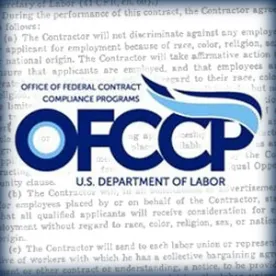As we previously reported, in March of this year, OFCCP issued its first directive of the Biden Administration – Directive 2022-01 (the “Directive”) – which addressed the issue of contractors’ obligations to conduct analyses of their compensation systems, as well as the agency’s expectations regarding providing those analyses when under audit. The Directive received a lot of (mostly negative) attention, for appearing to indicate the agency would demand privileged pay equity analyses during audits, as well suggesting that contractors are obligated by regulation to conduct full pay equity analyses.
Now, five months after issuing the Directive, the agency has issued significant revisions to it. As summarized in its announcement, the Directive has been revised in three main ways:
-
It explicitly reaffirms the agency’s position that it does not require the production of attorney-client privileged communications or attorney work product.
-
It identifies the documentation that OFCCP requires from a contractor to determine that the contractor has satisfied its obligation to perform a compensation analysis.
-
It explains the documentation required from a contractor when its compensation analysis identifies problem areas to demonstrate that it has implemented action-oriented programs.
It also removes references to “pay equity audits,” replacing the phrase with “compensation analysis,” in order to, as OFCCP Director Jenny Yang contends, “avoid any confusion regarding the nature of a contractor’s obligations.”
OFCCP “reaffirms” (or reverses) its position on production of privileged materials. With respect to production of privileged information, the Directive now states that the “Directive is not intended to encourage waiver of privilege. Rather, this Directive informs contractors that, where they maintain this information in non-privileged form, making it available can assist OFCCP in conducting a more efficient compliance evaluation.” While the agency characterizes this as a “reaffirm[ation],” it is clearly an effort to reverse the clear impression that the agency would be demanding privileged information the original Directive generated.
Even so, the agency makes clear that contractors will not be permitted to simply claim their compensation assessments are protected from disclosure during an audit. The Directive provides that “[c]ontractors will not be found in compliance with their compensation analysis obligations if they simply invoke privilege and provide OFCCP with no or insufficient documentation of compliance.” As discussed below, OFCCP maintains contractors have methods of confirming compliance without revealing privileged information.
OFCCP details what it expects to see from contractors regarding their compensation assessments. The Directive contends that contractors are required to conduct analyses of their compensation systems and provide documentation “confirm[ing] that the contractor has evaluated its compensation systems for race-, gender-, or ethnicity-based disparities.” The agency notes that “the most useful form of documentation is a contractor’s full compensation analysis because it allows OFCCP to understand how the contractor evaluates its compensation systems in practice,” and “encourage[s]” contractors to provide their “full compensation analyses available where OFCCP identifies concerns during a compliance evaluation.”
Where a contractor’s full compensation analysis contains privileged communications or protected work product, the Directive provides that the contractor “may fulfill its regulatory obligations by making available to OFCCP other documentation that it has conducted the [required] compensation analysis.” The Directive identifies a number of ways this can be accomplished:
-
“[A] contractor may make available a redacted version of its compensation analysis, provided that the non-redacted portions include the required facts” discussed in the Directive.
-
“[A] contractor may conduct a separate analysis during the relevant AAP period that does not implicate privilege concerns and provide that analysis to OFCCP in full.”
-
“[A] contractor may generate a detailed affidavit that sets forth the required facts described [in the Directive] but does not contain privileged material.”
The Directive notes that where compensation evaluation documentation is demanded by the agency, the contractor must
“provide documentation that demonstrates at least the following:
i. when the compensation analysis was completed;
ii. the number of employees the compensation analysis included and the number and categories of employees the compensation analysis excluded;
iii. which forms of compensation were analyzed and, where applicable, how the different forms of compensation were separated or combined for analysis (e.g., base pay alone, base pay combined with bonuses, etc.);
iv. that compensation was analyzed by gender, race, and ethnicity; and
v. the method of analysis employed by the contractor (e.g., multiple regression analysis, decomposition regression analysis, meta-analytic tests of z-scores, compa-ratio regression analysis, rank-sums tests, career-stall analysis, average pay ratio, cohort analysis, etc.).”
Documentation of Action-Oriented Programs To Correct Pay Disparities. The Directive also addresses the information a contractor must provide during an audit regarding pay disparities discovered during a compensation analysis. Specifically, the Directive provides that where such disparities are discovered, OFCCP regulations “require the contractor to develop and execute action-oriented programs to correct them.” As such, “OFCCP may request documentation demonstrating that the contractor did so.” When it does,
“OFCCP will require documentation that demonstrates, at a minimum:
i. the nature and extent of any pay disparities found, including the categories of jobs for which disparities were found, the degree of the disparities, and the groups adversely affected;
ii. whether the contractor investigated the reasons for any pay disparities found;
iii. that the contractor has instituted action-oriented programs designed to correct any problem areas identified;
iv. the nature and scope of these programs, including the job(s) for which the programs apply and any changes (e.g., pay increases, amendments to compensation policies and procedures) the contractor made to the compensation system; and
v. how the contractor intends to measure the impact of these programs on employment opportunities and identified barriers.”
In her blog post published on August 18, 2022, Director Yang confirms that “[c]ombatting pay discrimination is a top priority for OFCCP” and notes that OFCCP “reviews contractors’ pay data and practices to identify problems that would not otherwise come to light because workers are often unaware of their colleagues’ pay.”
As such, contractors need to understand that notwithstanding the welcome “reaffirmations” contained in the Directive, OFCCP remains focused on pay discrimination issues and will devote significant attention to compensation matters during audits. Contractors should familiarize themselves with the Directive, as revised, and ensure they are prepared to respond to OFCCP’s inquiries regarding their compensation analyses.




 />i
/>i
